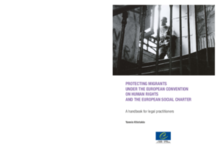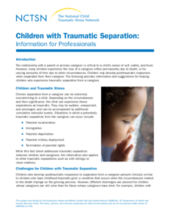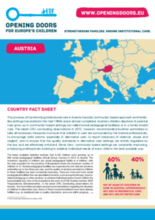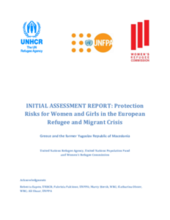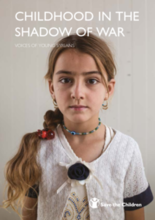Displaying 741 - 750 of 839
This paper highlights the difficulties faced by foreign minors and how the gaps in law leave them undocumented, vulnerable and unable to access social services. This paper also discusses how South Africa’s approach to accompanied and unaccompanied foreign minor children provides no durable long term solutions for these children, effectively leaving them in a legal hole once they reach the age of majority.
This chapter discusses the practice of child circulation in Ghana.
This handbook, produced by the Directorate General of Human Rights and Rule of Law, is a practical tool for legal professionals from Council of Europe member states who wish to strengthen their skills in applying the European Convention on Human Rights and the case law of the European Court of Human Rights in their daily work.
This guidance from the National Child Traumatic Stress Network provides information and suggestions for helping children who experience traumatic separation from a caregiver.
This fact sheet highlights Austria’s process in transforming institutional care towards community-based and family-based systems.
This report is an analysis of the overall findings from the research project on Haitian child domestic workers.
This pamphlet and the accompanying video, a joint publication by Save the Children and the International Organization for Migration (IOM), share the experiences of "children on the move" in various countries, including Turkey, Italy, and Sweden.
Concerned by the protection risks faced by women and girls, the United Nations Refugee Agency (UNHCR), the United Nations Population Fund (UNFPA) and the Women’s Refugee Commission (WRC) undertook a joint seven-day assessment mission to Greece and the former Yugoslav Republic of Macedonia in November 2015. This report describes the assessment’s findings and key recommendations for the European Union (EU), transit and destination country governments, humanitarian actors and civil society organizations (CSOs).
A mobile phone-based community surveillance system was piloted in the Democratic Republic of the Congo with the goal of identifying new cases of unaccompanied and separated children on a weekly basis.
Through the voices of children, parents and staff working in the region, this report by Save the Children presents a glimpse into the struggles faced by refugee and displaced children and families from Syria. The report is primarily based on children’s stories as told to Save the Children in urban areas in Lebanon and in camps and urban areas in the Kurdistan Region of Iraq. Drawings and other playful sessions were used with the children to help them tell stories of their everyday lives without the negative impact a deep interview might have.

